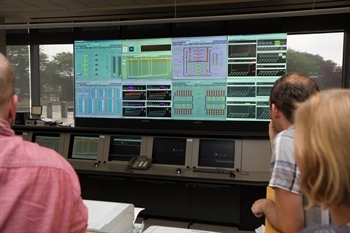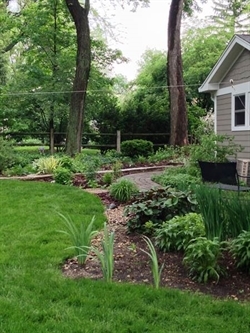
Thornton Quarry, part of the TARP system.
Some good and long-awaited stormwater news quietly dropped the other day—a federal judge approved the Metropolitan Water Reclamation District of Greater Chicago's (MWRD) Consent Decree, which is a binding agreement detailing very specific steps MWRD will take to move toward full compliance with the Clean Water Act and other federal guidelines on an equally specific timeline. There has been and will continue to be debate about whether the Consent Decree is strong enough, fast enough or green enough. But the reality is that it is now in place, and I'm excited that we can finally get to work on something, rather than sitting around waiting. I don't read too many court rulings, but I found this one quite scannable.

The TARP control room at the Stickney treatment plant.
MWRD, of course, is responsible for wastewater and stormwater management throughout Cook County; on a daily basis it discharges treated effluent to area waterways, and that water must meet Clean Water Act standards. The same requirements hold true in storms, and that's where most of the impetus for the Consent Decree lies: If there is more rain more quickly than MWRD's infrastructure system can handle, the result is overflows of untreated wastewater and stormwater into those same waterways...resulting it MWRD being out of compliance with aspects of its Clean Water Act (and associated regulation) requirements. To be fair, many other metropolitan areas have the same problems, and as a result have their own Consent Decree in place. Several years ago MWRD, the U.S. Environmental Protection Agency and the Ill. Environmental Protection Agency began working out the requirements—finish the Tunnel and Reservoir Plan (TARP) by X, improve collection of "floatables" in our waterways by Y, etc. When the draft Consent Decree was released for public comment, two separate coalitions of environmental organizations opined that the whole thing should be faster and greener. A federal judge was asked to determine if the requirements were reasonable, that went on for a bit, he decided they were, and now it's what we have to work with, so let's get to work.
Some of the notable targets:
- Full completion of TARP (aka, the Deep Tunnel) by 2029, with key milestones in 2015 and 2017. Once complete, TARP will have a storage capacity in the vicinity of 17.5 billion gallons of combined stormwater and wastewater (that's billion with a B). One ongoing issue with the completion of TARP is that the reservoirs are being excavated by contracted third parties, and they are not held to the same requirements as MWRD. There is some chance that the whole process could be delayed as a result, which is worrisome, no doubt. If MWRD is responsible for delays, they will now have to pay daily fines.
-

Actual green infrastructure, actually built, actually in Cook County.
Lois Vitt Sale
- Rain barrels, rain barrels, rain barrels. This is going to be tough. MWRD needs to distribute 15,000 low- or no-cost rain barrels within five years. MWRD has long sold rain barrels, but now lots of other people do too (case in point), and MWRD's sales have tailed off a bit. My take on this is that MWRD should look to partner with folks like the Community and Economic Development Association of Cook County (CEDA), which is busily weatherizing homes for low-income residents throughout the county. Want some better insulation? Great, you get two rain barrels too, plus some basic training on sustainable landscaping. Just a thought.
- And floatables. We all know that there is stuff floating in the Chicago and Calumet rivers. Garbage, tree limbs and yes, the occasional dead rat (or worse). MWRD needs to step up its removal of these items, which will require purchasing two new specialized boats (it already has some, just FYI), and developing a rapid response system after large storm events that utilize all of its boats.
Ultimately, the federal judge weighing in on this was not in a position to say "this is a great bundle of requirements" or "this needs some work." The question posed to the judge was whether these requirements were reasonable. In the mind of the judge, they were, and so the agreement is now on the books.
So now it's time to stop bickering and get to work. Let's figure out the most strategic way to develop that green infrastructure, so that it's a real benefit to some particularly flood-prone areas, rather than just being rain gardens in random places. Let's figure out the most expedient way to distribute those rain barrels where they are needed most, will be best managed, and might prompt additional green infrastructure investments. And yes, let's keep trying to figure out ways to get TARP done faster. Let's also be vigilant in monitoring progress and whether these investments in stormwater infrastructure work. This Consent Decree is not our region's final chance to determine necessary investments to improve stormwater management. It will keep raining here for the foreseeable future. So in 2015, or 2017, or 2029, and every step in between, let's keep trying to work as a cohesive watershed and sewershed community to constantly improve the efficacy of our actions, the quality of our water, and our management of rain.